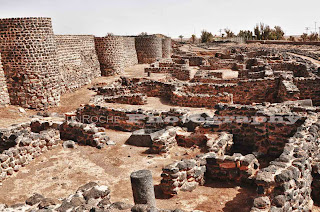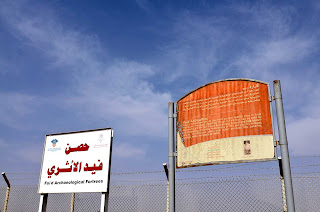It was a lovely morning, the smell of fresh air and the
sound of birds chirping greeted me on my way out of the hotel. It was Thursday
morning and I just completed my assignment in Hail. Driving home to Riyadh, I
was not so eager to return to the city since I'm leaving alone in my flat.
Driving along Riyadh-Buraidah hi-way just about 20 km. from where I came
from..I noticed a red signage with the Saudi Tourism logo. "Welcome to
Faid City"....70 km...Looking at my watch, I estimated to pass by this
place within half an hour. I remember what the branch manager informed me, that
there was a new historical site recently excavated somewhere on the hiway going
to Buraidah. Could it be this site? With nothing to do in Riyadh and the site
just 10 km. from the main highway..I decided to visit and explore the history of
this treasure.
I was surprised that in the site of the historical structure
there was a Saudi Tourism office. The tourism officer greeted me with the best
smile upon seeing me entering the main entrance door. My excitement started to
be replaced with worries when I heard the other officer informing me that if I
opt to enter the historical site, a permit from SCTA main office is required. I
was so upset and started to return to my car when the other officer called me
and with hand gestures advised me smiling that I can enter the site but only
for an hour. I jumped out of my car immediately with my camera and entered the
site main gate..walking inside I heard the guard shouted at me...."Boss
just an hour before prayer time".. I looked back and gave him a smile and
raised my hand with right thumb up...The guard smiled back and shouted yaallah.
Located in the middle of Zubidah path. This path was
developed by Zubaidah, the wife of Harun Al Rashid, the Abbasid Caliph.
Faid was considered to be an important location back in the
pre-Islamic and the beginning of Islamic ages. Prophet Mohammed peace be upon
him gave the land of Faid to a brave knight called "Zaid Al-Khail
Al-Tai". The recognition of this important site increase during the
Islamic Ages as it became the pathway for Islamic armies on their way to
Mesopotamia.
Faid was considered the largest pathway station ever where
it consists of the ruins of huge palace built of basalt stone (Krash Palace).
This palace has a rectangular shape of 240m x 270m, the northeast yard has a
square shaped fort about 40m in demensions. To the north of this palace, there
are number of structures that can be identified as halls or large connected
rooms, and to the south of this structures there is what is assumed to be the
heart of Faid city due to the extensive urban structures in the area where
there is a rectangular building 90m x 40m and inside this building there is
another rectangular structure. There are two large pools in the southeast of
Krash Palace, one is square shaped about 4m x 4m in dimensions, the other is
rectangular about 20m x 30m.Both pools are connected with a 42m long and 43cm.
wide canal. Recently a new pool was discovered to the north of the palace that
was not mentioned in any historic document. The pool has an octagonal shape and
connected to the palace with a small canal, which could lead to the assumption
that it was the palace private pool. A large section of the southern wall was
excavated and restored in addition to various ovens and architectural units.
(Source: SCTA pamphlet Faid Historic City Prepared by Saad
Al-Rwisan)
A. A view of historic Fayd City
C. The SCTA sign at the ruin main gate
70 Km. from Hail towards Buraydah. There is a signage on the
Hail - Buraydah Hi-way but this signage is mostly visible if going to Buraydah
coming from Hail. Do not be confuse of the signage since initially the signage
mentions Faid City, as you approach the exit going inside the town proper, the
spelling of the signage changes to Fayd City.
Gasoline stations are available just in front of the Museum.
Can be visited even by small cars.
There are small restaurants only, it's advisable to carry
your snacks although bottled mineral water are available in the gas stations
and small bakala's.
Visitors are advised to visit the site from 9 am to 3 pm. SCTA permit required before traveling to the site. In case the visitor has no SCTA permit, the site can be explored thru the photographs displayed inside the museum.
More Image of Faid City can be viewed in :



No comments:
Post a Comment